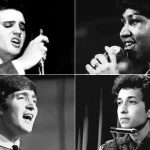
Step into the ring of the latest clash shaping the music industry landscape – the UMG-TikTok war! As Universal Music Group (UMG) and TikTok engage in a battle over licensing agreements, the future of User Generated Content (UGC) on social media platforms hangs in the balance. Join us as we explore what this showdown means for UGC licensing and how it could potentially reshape the way music is shared and enjoyed online. Let’s dive in!
UGC Licensing After the UMG-TikTok War
In the aftermath of the UMG-TikTok war, the landscape of User Generated Content (UGC) licensing stands at a crossroads. With TikTok removing Universal’s music publishing catalog from its platform, questions arise about the future of content creation and sharing. How will this pivotal moment impact creators’ ability to use popular music in their videos? The repercussions extend beyond just these two industry giants; they could potentially set a precedent for how other platforms handle UGC licensing agreements.
As we witness this clash unfold, it becomes evident that the outcome will have far-reaching effects on both artists and users alike. Will this conflict lead to stricter regulations around music usage on social media? Or could it spark innovation in how licensing agreements are structured in the digital age? Only time will tell how this power struggle between UMG and TikTok shapes the realm of UGC licensing moving forward.
TikTok’s Response to Removing Universal’s Music Publishing Catalog
In the wake of TikTok removing Universal’s Music Publishing Catalog, users were left wondering about the platform’s next move. Speculations ran rife as to how this decision would impact the user experience and content creation on TikTok. However, TikTok swiftly responded with a statement assuring its community that they were working to find solutions in collaboration with UMG.
The latest developments indicate that negotiations between TikTok and UMG are ongoing, hinting at a potential resolution in the near future. This proactive approach from both parties signals a willingness to address concerns and reach common ground for the benefit of all involved.
As users eagerly await updates on the situation, it remains crucial for platforms like TikTok to navigate licensing agreements strategically while upholding their commitment to fostering creativity within their community.
Latest Developments
The latest developments in the UMG-TikTok war have sent shockwaves through the music industry. With Universal Music Group pulling its catalog from TikTok, users are left wondering about the future of their favorite platform for sharing content.
This move by UMG has raised questions about the power dynamics between major record labels and social media giants. It also highlights the importance of licensing agreements in a digital age where user-generated content plays a significant role in promoting music.
As both parties navigate this conflict, it will be interesting to see how TikTok responds to fill the gap left by UMG’s absence. Will they seek alternative partnerships or renegotiate terms with other music publishers to maintain a diverse library for creators on their platform?
In the fast-paced world of digital entertainment, adaptation is key. The evolving landscape of UGC licensing after this war could pave the way for new strategies and collaborations that benefit artists, platforms, and audiences alike.
Implications for UGC Licensing
The recent clash between Universal Music Group (UMG) and TikTok has sparked concerns about the future of User Generated Content (UGC) licensing. With UMG pulling its music publishing catalog from TikTok, it raises questions about the platform’s ability to sustain its massive user base without access to popular tracks.
This move could lead to a significant shift in how UGC platforms negotiate licensing deals with major music labels. It may prompt stricter regulations on what content creators can use in their videos, impacting the creativity and diversity of content on platforms like TikTok.
As UGC continues to be a driving force behind social media engagement, any restrictions on licensed music could alter the landscape for both users and artists. The implications of this conflict reach far beyond just these two entities, potentially reshaping how music is shared and consumed online.
UMG’s Licensing Agreement with TikTok
Universal Music Group’s licensing agreement with TikTok has been a hot topic in the music industry recently. The deal between these two giants had its expiration date looming, causing quite a stir among artists and users of the platform. With UMG being one of the world’s largest music companies, their partnership with TikTok held significant weight in shaping how music is consumed and shared on the app.
The implications of this licensing agreement going sour could potentially disrupt the flow of user-generated content on TikTok, impacting both established artists and up-and-coming musicians. As tensions rose, questions were raised about how this would affect not only UMG’s catalog but also the overall landscape of UGC licensing agreements within social media platforms.
Industry experts have been closely monitoring this situation, offering insights into what this showdown means for artists, labels, and even independent music publishers who rely on platforms like TikTok to reach wider audiences. The outcome of this battle will undoubtedly shape future negotiations between rights holders and tech companies in an ever-evolving digital ecosystem.
Expiration Date and Consequences
As the expiration date of UMG’s licensing agreement with TikTok looms closer, industry insiders are watching closely to see what consequences may follow. Will this mark a turning point in how UGC platforms handle music licensing? The potential fallout could have far-reaching effects on both content creators and artists alike.
With uncertainties surrounding the future partnership between these giants, questions arise about how this will impact user-generated content on one of the world’s most popular social media platforms. As negotiations continue, stakeholders wonder whether a new precedent will be set for licensing deals in the digital age.
The repercussions of this showdown could shape not only how music is shared and consumed online but also influence broader trends within the entertainment industry as a whole. The stakes are high, and all eyes are on how UMG and TikTok navigate these uncharted waters moving forward.
Potential Impact on Music Industry and Artists
The TikTok-UMG clash has sent ripples across the music industry and artists alike. With UMG’s massive catalog withdrawn, creators face limitations in using popular tracks for their content. This move could spark a shift towards independent music or emerging artists seeking exposure on the platform.
As tensions rise, the potential impact extends beyond just lost soundtracks on viral videos. The dispute sheds light on larger issues like fair compensation for musicians and copyright protection in the digital age. Artists may find themselves exploring alternative avenues to reach audiences directly without relying heavily on major labels.
Industry experts are closely monitoring this showdown as it sets a precedent for future negotiations between tech giants and record labels. How this conflict unfolds could reshape how platforms like TikTok handle licensing deals moving forward, ultimately influencing how music is shared and consumed online.
Comparisons to Hollywood Strikes
When we think of industry showdowns, Hollywood strikes often come to mind. The tension between creators and distributors can disrupt the entire ecosystem. Just like how actors and studios battle over fair compensation, the TikTok-UMG war reflects a similar struggle within the music realm.
In both cases, negotiations are key. Finding common ground that benefits all parties is crucial for long-term success. When disputes escalate, it’s not just about money; it’s about power dynamics and control over content distribution.
The impact goes beyond just the immediate players involved. Like ripples in a pond, these conflicts can reshape how content is shared and consumed by audiences worldwide. As we navigate through this UMG-TikTok confrontation, parallels to historic Hollywood labor disputes remind us of the enduring importance of fair deals in creative industries.
Perspectives from Industry Experts
Industry experts have varied perspectives on the UMG-TikTok showdown. Some believe that this conflict could set a precedent for future negotiations between music labels and social media platforms. Others argue that this clash highlights the need for clearer regulations surrounding UGC licensing in the digital age.
Certain experts suggest that TikTok may seek alternative partnerships to fill the gap left by Universal Music Publishing’s removal. This could potentially lead to new opportunities for independent artists and smaller music publishers to gain exposure on the platform.
On the flip side, some industry insiders express concerns about how this dispute might affect emerging artists’ ability to share their work on TikTok freely. The outcome of these negotiations could shape the landscape of UGC licensing agreements moving forward, impacting both established musicians and up-and-coming talents alike.
Industry experts are closely monitoring how UMG and TikTok navigate this conflict, as it has broader implications for music consumption in today’s digital era.
Indie Music Publishers and UGC Licensing on TikTok
Indie music publishers play a crucial role in the evolving landscape of UGC licensing on platforms like TikTok. While major labels dominate the industry, independent publishers bring diversity and fresh perspectives to the table. With the UMG-TikTok dispute unfolding, indie publishers have an opportunity to step into the spotlight and showcase their artists’ talents.
UGC licensing on TikTok for indie music could see a shift towards more diverse content as creators explore non-mainstream tracks. This presents both challenges and opportunities for smaller publishers looking to gain exposure in a competitive market.
The collective impact of indie music publishers engaging with TikTok could lead to a broader range of music being shared and celebrated on the platform. As users discover new sounds beyond commercial hits, there’s potential for underground artists to reach wider audiences and build dedicated fan bases.
In this dynamic environment, indie publishers must navigate licensing agreements carefully to protect their rights while leveraging TikTok’s vast user base for promotion and discovery. The outcome of this ongoing battle between UMG and TikTok will undoubtedly shape how indie music is licensed and consumed in the digital age.
Threats and Opportunities
As the UMG-TikTok war unfolds, indie music publishers find themselves at a crossroads of threats and opportunities in the realm of UGC licensing on the platform. On one hand, the removal of Universal’s catalog may open up space for independent artists to shine brighter. This could lead to increased visibility and recognition for those outside the mainstream music industry.
However, there’s also a looming threat that without major label backing, indie publishers might struggle to compete for attention amidst TikTok’s sea of content. The risk lies in potential overshadowing by viral tracks from major labels that dominate popular trends on the app.
Despite these challenges, there is an opportunity for creativity and innovation within this disruption. Indie publishers can leverage this moment as a chance to showcase their unique sounds and build authentic connections with audiences craving fresh music experiences.
In navigating these uncharted waters post-UMG fallout, indie publishers must adapt swiftly to seize emerging opportunities while mitigating risks inherent in a shifting UGC landscape on TikTok.
Collective Impact on the Platform
In the aftermath of the UMG-TikTok war, the collective impact on the platform is a topic that resonates across the music industry. Indie music publishers are navigating uncharted territories, with threats and opportunities unfolding in equal measure. The shakeup in UGC licensing could redefine how artists engage with their audience on TikTok, potentially altering strategies for exposure and revenue generation.
As tensions simmer between major players like UMG and TikTok, there’s a palpable sense of uncertainty among content creators and users alike. The dynamics of this showdown go beyond just these two giants; they ripple through the entire ecosystem of music consumption online. How indie labels adapt to this shifting landscape will shape not only their fortunes but also influence broader trends in digital content creation.
The stakes are high as platforms grapple with balancing user-generated content and copyright protection. Finding a middle ground that satisfies all stakeholders remains an ongoing challenge amidst evolving regulations and industry norms. The collective impact on TikTok’s ecosystem underscores deeper questions about fair compensation for creators and sustainable business models for rights holders.

